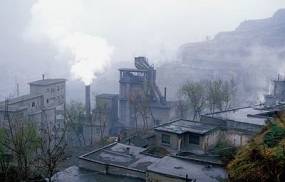A look at Bill McKibben’s book Deep Economy: The Wealth of Communities and the Durable Future…
I’ll start with two words that may end all your interest in Deep Economy:
Global warming.
McKibben’s an activist for fixing the issue. As for me, I’m not convinced that global warming is, indeed, a man-made phenomena. I’m not even convinced that we’re experiencing a warming at all. Many blogosphere pundits who jeer at the whole idea of global warming got a hoot this last week when NASA corrected some temperature readings from the last decade and it showed that we were slightly cooler than previously reported.
Stay with me, though.
Deep Economy begins with energy. McKibben argues, quite forcefully, that energy makes the modern world possible. And the main sources of energy that created our world as we know it are coal, oil, and natural gas: fossil fuels. The amount of power we glean from just a gallon of gasoline shames the power found in some Old World farmer’s entire menagerie of beasts of burden. Hydrocarbon-based fuels replaced muscle power by an order of magnitude. They, in turn, led to the burst of invention that gave us new forms of transportation, the miracle of electricity, long distance communication, and thousands of other modern conveniences we take for granted.
Before fossil fuels, the idea of fantastic economic growth escaped us. But with their dynamic ability to reduce labor, those fuels made consumerism and unbridled growth possible.
But, as McKibben rightly notes, growth may come with an enormous price tag in terms of ecological fallout. We in the United States were forced to deal with our growth’s deleterious effects back in the 1970s. Those of us born before that time can remember the waters around Cleveland catching on fire. You don’t need a chemistry degree to know that fire and water don’t mix unless something is very, very wrong.
I live by one of the small tributaries of the Little Miami River. Thirty years ago, that river was one of ten most polluted waterways in the United States. McKibben would argue that growth had much to do with the downfall of that river system, and I totally agree.
Today, though, we’ve restored the Little Miami, if not to its Edenic glory, at least to a level higher than “cesspool.”
Yet while we can claim that success, our unlimited desire for more is only shifting environmental disaster elsewhere. The fall of the Iron Curtain shocked many Westerners when they discovered the toll keeping up with the West’s growth had taken on the Communist nations. One hellhole after another sprouted up out of the countryside in places like Romania and Russia. Entire cities succumbed to chemical production plants, metal smelting plants, and more. Iridescent rivers filled with mercury, cadmium, and arsenic ran through towns.  Diseased residents, like something out of a post-apocalyptic nightmare, stumbled around in sunless wastelands wreathed in smog.
Diseased residents, like something out of a post-apocalyptic nightmare, stumbled around in sunless wastelands wreathed in smog.
And lest we think those days are a thing of the past, India and China stand ready to re-enact them.
We live in the richest nation on Earth, and the gospel of growth requires we export it elsewhere. Shareholders must be satisfied, cheap goods must be had, and growth must continue.
But what will be the impact of 2.5 billion people acquiring cars? With 300 million in population, the United States (according to 2004 DOT estimates) contains 243,023,485 registered vehicles. We live and die by our cars here. Worse, we export that same desire to the rest of the world. Car ownership in China increases exponentially and shows unlimited growth potential. What would happen if the 2.5 billion people in China and India buy into the “need” for a car? What does it mean for the health of our world if keeping up with the Joneses becomes keeping up with the Wus and Patels?
Consider the amount of energy needed to simply build a car. Estimates vary, but a healthy figure would be roughly 35 barrels of oil (or 1,470 gallons) per car. With an average lifespan of about 15 years, that car will consume an additional 19,500 gallons of gas.
Now ask where what will happen if India and China demand cars at the rate we Americans do.
Oil experts in the West can’t get the Saudis to fess up to the state of their oil fields. Some believe their Ghawar bed is fast declining. When even the pro-growth The Wall Street Journal writes about “peak oil” and the sucking dry of oil beds around the globe, people need to wise up.
And folks, this is before India and China demand cars.
Our lust for more growth requires energy. It also screams for raw materials. Many of the the carelessly purchased signs of the Good Life™ we buy without thinking come from plastics, and, therefore, oil. We trucked those trinkets from far away, burning energy in shipping them. As McKibben so wisely notes, what is the point of air freighting Danish-made sugar cookies to the United States while simultaneously shipping American-made sugar cookies to Denmark?
Due to complex chemical binding processes, one gallon of burned gasoline (at 6.25 pounds) puts nearly 20 pounds of carbon dioxide into the air. I read recently that we now have 200 more parts per million of carbon dioxide in the air today than we did in the 1950s. And the results? It’s hard to know them all, though thousands surely exist. One comes to mind right away. Beyond the disputed global warming process, no scientist disputes that poison ivy’s more potent today than in yesteryear. Scientists found out why, too: the more carbon dioxide the ivy absorbs from the air, the more potent the toxic oil in its leaves. At last count, 75 percent more toxic than when I was a kid.
What else will we be forced to learn too late? Will it be worse than super-poison ivy?
Now no matter what you think of my opening comments about global warming, even if you forget environmental issues, profligacy sits rotting at the core of growth at all costs. When it takes seven times the caloric value of a box of cereal to ship it than can be derived from eating it, aren’t we profligate with how we use energy? When our houses are twice the size they were thirty years ago, but with smaller families, aren’t we profligate? When it’s all about the individual and what we can consume, haven’t we lost our souls?
Eugene Peterson says this:
The cultivation of consumer spirituality is the antithesis of a sacrificial, “deny yourself” congregation. A consumer church is an antichrist church.
So apart from the environmental impact of growth, something truly awful happens to us on the inside as we participate in a consumeristic culture obsessed with more.
McKibben begins Deep Economy with a story of a young Chinese girl experiencing the reality of two economic truths: More and Better. He’s not against improving people’s lives by providing the poorest of the poor with some of the blessings of modern technology. Sometimes More and Better go hand in hand. (Obviously, technology gave us improved medical care and less drudgery.) McKibben tells of the Chinese girl’s backbreaking life in the rural countryside and notes the opportunities afforded her by small blessings brought by growth.
But More and Better fail when a society reaches Better and can’t add to it. At that point, More grows insidious. More becomes the be-all and end-all of life.
In the next installment of my look at Deep Economy, we’ll examine the toll on communities and individuals wrought by More.

 Someone we know well referred to my wife and me as “hippies” for some of the ideals we espouse that touch on these topics, and while we take that lovingly, we also understand that people don’t fathom what we’re talking about.
Someone we know well referred to my wife and me as “hippies” for some of the ideals we espouse that touch on these topics, and while we take that lovingly, we also understand that people don’t fathom what we’re talking about.